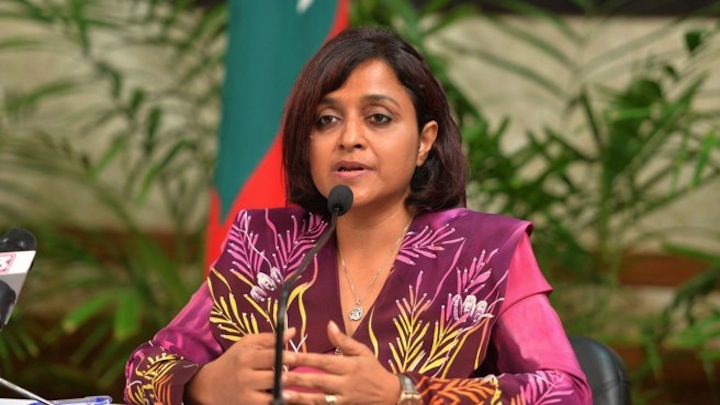The cabinet has decided to reassess the Maldives’ membership in the Commonwealth following repeated threats to leave the inter-governmental organisation.
President’s office spokesperson Ibrahim Muaz Ali told the press today that government “needs to explain to the people how much the country benefits from being part of the Commonwealth.”
“That is what the government is going to reassess,” he said, adding that the government will consider the assistance and benefits the country has received since joining in 1981 as well as the Maldives’ present role in the organisation.
Ministers recommended the reassessment to President Abdulla Yameen at today’s cabinet meeting, he said.
Muaz, however, stressed that the cabinet has not decided to leave the Commonwealth.
Earlier this month, foreign minister Dunya Maumoon said the Maldives “will seriously consider its membership at the Commonwealth” if it is placed on the agenda of the Commonwealth Ministerial Action Group (CMAG) for a second time in four years.
Some Commonwealth members had pushed for the CMAG to assess alleged violations of the Commonwealth’s principles by the Maldives over the widely criticised imprisonment of former President Mohamed Nasheed.
However, the Maldives was not placed on the CMAG agenda despite “efforts made by some of the most powerful countries in the Commonwealth to place the Maldives on the group’s agenda and harm the nation,” the foreign ministry said on July 5.
But former foreign minister Dr Ahmed Shaheed said that the CMAG only granted the Maldives further time to “sort out [the] mess Maldives is in.”
In mid-June, Canada had called on CMAG to “urgently put the deteriorating situation in the Maldives on its formal agenda.” The Commonwealth’s democracy and human rights arm can recommend measures for collective action to restore democracy and constitutional rule.
Diplomatic pressure has been mounting on President Abdulla Yameen to release Nasheed and other jailed politicians, including two former defence ministers and a ruling party MP.
UK “closely involved”
Meanwhile, in response to a question posed by Karen Lumley, conservative MP for Redditch, at the House of Commons on Tuesday, minister of state at the foreign and Commonwealth office Hugo Swire said the British government remains “deeply concerned by the situation in the Maldives.”
He noted that Prime Minister David Cameron had called for Nasheed’s release from custody as well as all-party talks to resolve the six-month long political crisis.
Nasheed’s Maldivian Democratic Party (MDP) is currently engaged in talks with the government. At the third meeting of the talks this week, MDP representative Ibrahim Mohamed Solih suggested that the opposition leader could be freed on July 26, when the Maldives marks 50 years of independence from the British.
Nasheed was transferred to house arrest in late June after the opposition backed a constitutional amendment that will allow President Abdulla Yameen to replace his deputy.
Swire meanwhile welcomed Nasheed’s transfer to house arrest and the ongoing political dialogue. “We hope the talks will provide the basis for progress on the numerous concerns within the Maldives,” he said.
Asked if he believed the Commonwealth should take action against the Maldives, Swire noted that the UK is not a member of CMAG.
“I have discussed these matters with the Commonwealth Secretary General,” he said.
“I understand that there has been a telephone conversation between CMAG members and that they keep the situation under continuous review.”
John Glen, conservative MP for Salisbury, urged the UK government to “resist complacency on the Maldives,” suggesting that “the current regime seems also to be a recruiting sergeant for ISIL in the Maldives.”
“There will come a time when the government will need to stand clearly on the right side of the argument and intervene more fully to secure justice in that country,” he advised.
In response, Swire said he has recently discussed the Maldives with the Indian foreign secretary and the US assistant secretary of state.
“Both my right honourable friend the Prime Minister and I have met Mr Nasheed’s wife, and Amal Clooney and other members of Mr Nasheed’s legal team, to discuss the situation. We are closely involved,” he said.
Asked about possible sanctions on the Maldives in late June, Swire had said that the UK government has not “discussed the possibility of sanctions with international partners, though we are keeping all options under review.”
 (0)Dislikes
(0)Dislikes (0)
(0)

